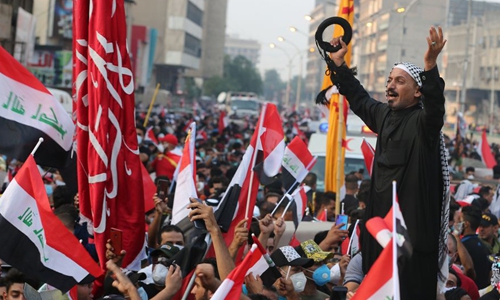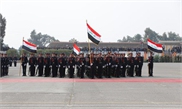31 protesters killed in anti-gov't demonstrations over past 3 days in Iraq: statement

People take part in a protest in Baghdad, Iraq, on Oct. 29, 2019. (Xinhua/Khalil Dawood)
The Iraqi Independent High Commission for Human Rights (IHCHR) said on Thursday that a total of 31 demonstrators were killed and more than 1,000 others wounded during the past three days of anti-government protests in capital Baghdad and southern provinces.
A statement by IHCHR said that "the commission's teams have registered, during the period from Nov. 26 to 28, the use of excessive force by the security forces, leaving 25 protesters killed in Dhi Qar province, four in Najaf province and two in the Iraqi capital Baghdad."
IHCHR also expressed its deep concern about the high number of casualties among both the demonstrators and the security forces during the three days due to the violence and the use of weapons, as well as the burning of many public and private properties, including the Iranian consulate in Najaf, some 160 km south of Baghdad, according to the statement.
Earlier in the day, the Iraqi Foreign Ministry condemned in a statement the attack by some demonstrators on the Iranian consulate in Najaf on Wednesday night.
The ministry said the purpose behind burning the Iranian consulate is "to harm the historical relations between Iraq and Iran, as well as with the rest of the world states whose missions are working in Iraq."
It reaffirmed its warning that there are some persons who want to derail the demonstrations by distorting the fair demands of the demonstrators.
The Iraqi ministry affirms that "the diplomatic missions operating in Iraq are highly respected," and what happened to the Iranian consulate "does not represent the Iraq's official point of view."
Many protesters accuse neighboring Iran of interfering in Iraq's internal affairs.
Mass demonstrations have continued in the capital Baghdad and other cities in central and southern Iraq since early October, demanding comprehensive reform, accountability for corruption, improvement of public services and job opportunities.

